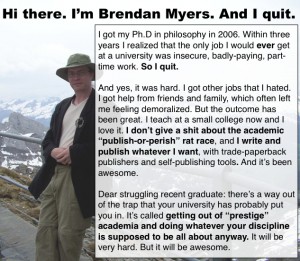I’ve been reading a lot lately about the situation of young grad students or people who recently completed their graduate degrees. Many of them, perhaps nearly all of them, face ridiculous barriers to entry into good university jobs in their fields. Here’s some examples:
The Closing of Academic America
9 reasons why being an adjunct faculty is terrible
And my favourite, “Thesis Hatement”.
Here’s my story.
I got my Ph.D in philosophy in 2006, and in a short length of time I was working as a sessional lecturer (that’s “adjunct faculty” to my American friends) at a very fine Canadian university, one with colleagues who I liked, and where I generally enjoyed working. However, within a few years I realized that the only job I would ever get at that university, or any other, was insecure, badly-paying, part-time teaching work, with no acknowledgement of any research I was doing.
When I applied for a regular faculty position at another nearby university, where I also briefly worked as a sessional, the head of the department told me that I hadn’t enough publications. I pointed out that I had published four books already, which was more than she herself had published. She replied that none of them were academic books (that was true of one, but only half-true of the others) and that therefore they didn’t count.
That short five-minute conversation left me almost completely disillusioned about the academic world.
So I quit.
And yes, quitting the academy was hard. I got other jobs, some of which I hated. I got help from friends and family, which often left me feeling demoralized. I had pegged my sense of identity and self-worth on the academic mortarboard, and that made it very was hard for me to imagine any other career for myself, or any other way of life. Quitting the university was one of the most stressful and unhappy decisions I’ve ever made.
But the outcome has been great. I teach at a small college now where they pay me only slightly less than what I’m worth, and I love my students there. I don’t give a shit about the fashion-driven rat race of “publish-or-perish”. And therefore I write and publish whatever I want, with trade-paperback publishers and self-publishing tools. And now I’ve published fourteen books, in only eleven years.
In that sense I’m not fully “quit” from the academy: I just changed my path to get to it. I see it now as having quit the “prestige” academy.
And yes, it took me a long time to get to this point. But the single most important thing I did to get here was stop caring about fitting into the “prestige” academic world and start caring more about what my discipline is supposed to be all about: the love of wisdom, the critical examination of answers to the highest and deepest questions in life.
I doubt that I will ever work for a university again. I’m certainly not applying for university jobs: and if a university was to actively recruit me (which isn’t likely) then they would have to offer me something really awesome. Because I refuse to work as a sessional, ever again.
Dear struggling recent graduate: I feel your pain. Not long ago, I was in the same place you are in now. But I assure you, there’s a way out of the trap that your university has probably put you in. It’s called quitting the world of “prestige” academia and doing whatever your academic discipline is supposed to be all about anyway. Just stop chasing the carrot that they’re dangling in front of you, and plant your own carrots in your own garden. Remember, it’s not the word “scientist” on your pay stub that makes you a scientist. It’s the doing of good science that makes you a scientist. And think of how many great minds in the canon of Western civilization were never professors: Jean-Paul Sartre, Baruch Spinoza, as examples. If they could do it, so can you.
So if you’re seeing too many obstacles in the academic world between you and your aim to become a good scholar in your field, then quit the academic world and be a scholar anyway. Use the public libraries or your alumni card or the internet to get your research materials. Work for companies that do work in your field, or work for government agencies that fit your interests, or get together with others in the same situation as yourself and start your own business. It’s a very scary move: there is a lot of risk, and a real chance of failure. But your alternative is to chase after a carrot that your university will almost certainly never give you, and to still be paid barely enough to rent a crappy apartment by the time you are old enough to retire.
I leave you with the words of renowned scientist James Lovelock:
I have had to become a radical scientist also because the scientific community is reluctant to accept new theories as fact, and rightly so. It was nearly 150 years before the notion tha theat is a measurue of the speed of molecules became a fact of science, and 40 years before plate tectonics was accepted by the scientific community. Now perhaps you see why I work at home supporting myself and my family by whatever means come to hand. It is no penance, rather a delightful way of life that painters and novelists have always known about. Fellow scientists join me, you have nothing to lose but your grants.
(Lovelock, The Ages of Gaia, 1990)


One Response to Hi there. I’m Brendan Myers. And I quit.